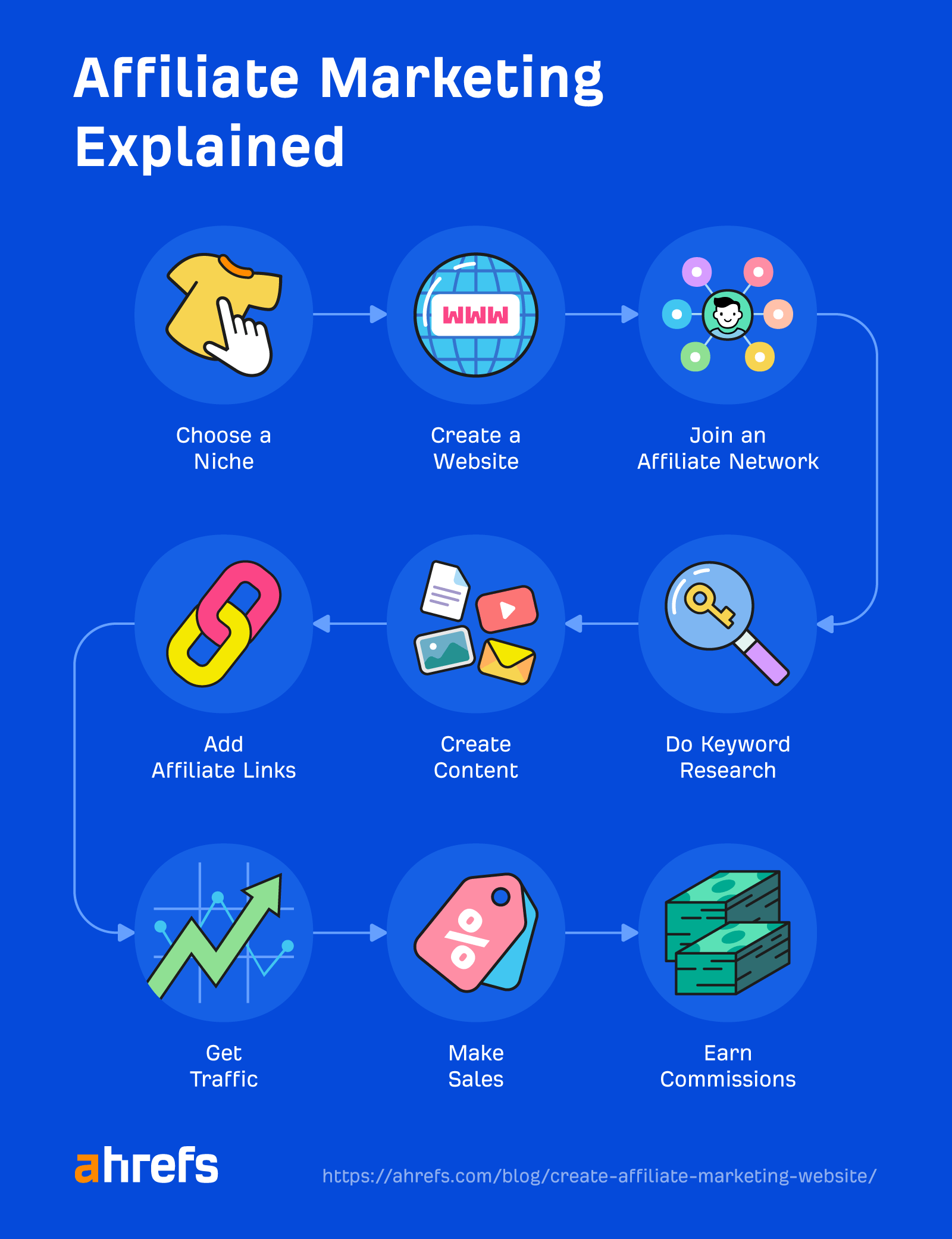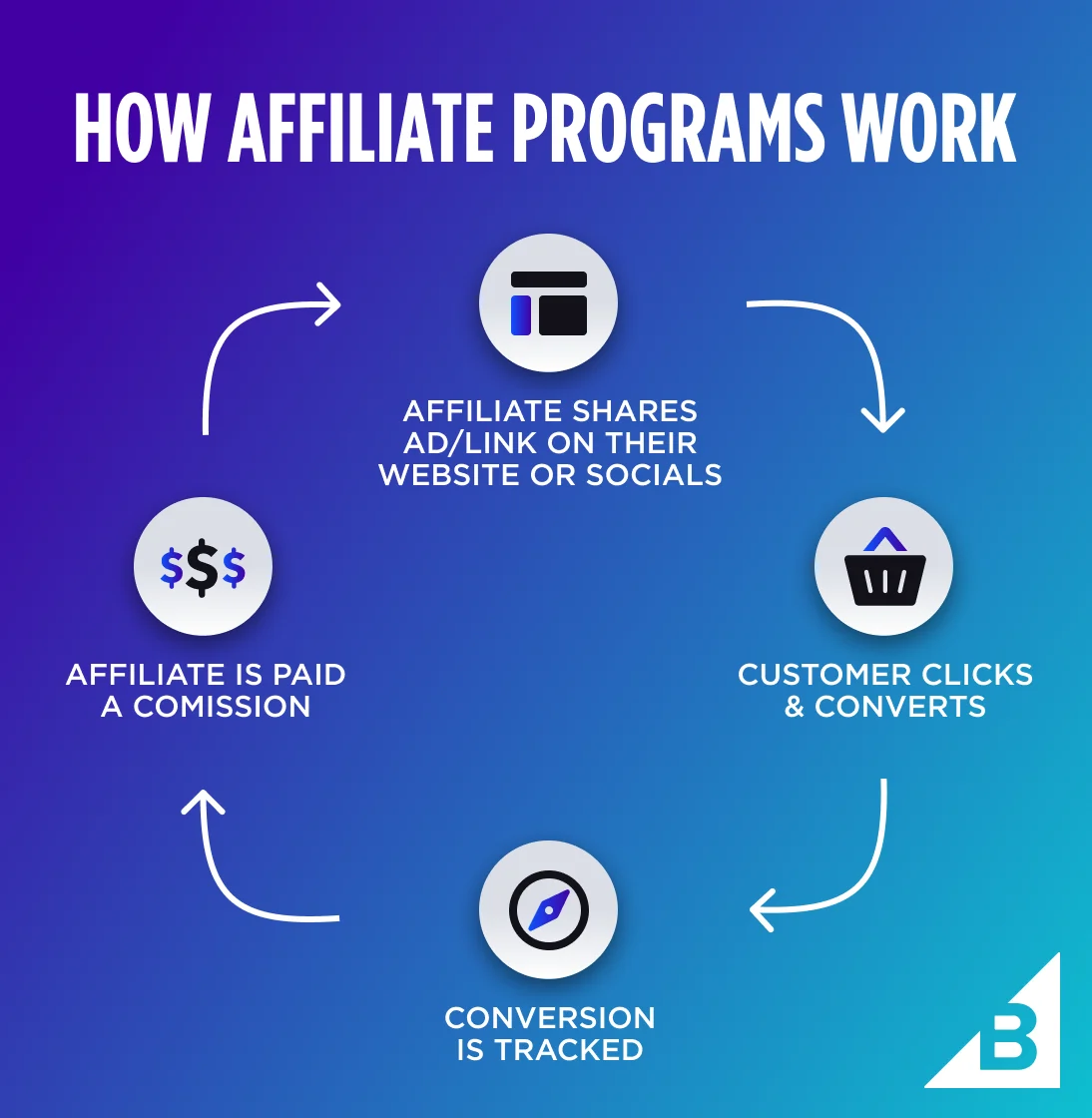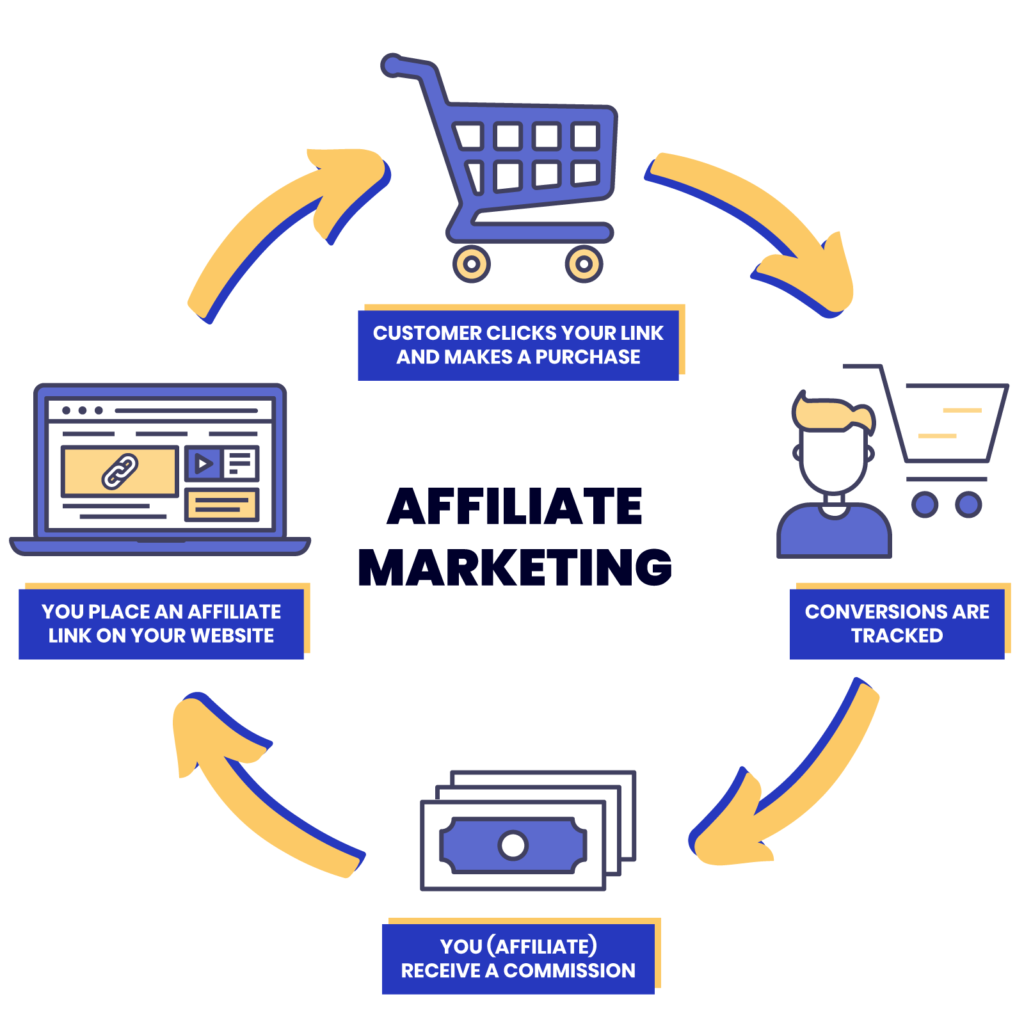Where Do You Do Affiliate Marketing: Maximize Earnings Now!
Affiliate marketing is typically done on websites and blogs through product reviews and recommendations. In this marketing model, content creators earn a commission for promoting products or services that generate sales through their unique affiliate links.
Affiliate marketing is a popular way for content creators to monetize their websites and blogs. By promoting products or services through product reviews and recommendations, they can earn a commission on each sale made through their unique affiliate links. This marketing model is commonly used by bloggers, influencers, and website owners to generate income from their online platforms.
It provides a win-win situation for both the content creator and the business, as the content creator earns a commission and the business gains exposure and sales. With the rise of e-commerce and online shopping, affiliate marketing has become a significant part of the digital marketing landscape.
The Affiliate Marketing Landscape
Affiliate marketing has become an integral part of the digital marketing landscape, offering endless opportunities for both businesses and individuals to generate passive income. Understanding the key players and platforms, as well as the current trends and future projections, is crucial for anyone looking to venture into this dynamic field. Let’s delve into the affiliate marketing landscape to gain a comprehensive understanding of its ecosystem.
Key Players And Platforms
The affiliate marketing landscape is populated by various key players and platforms that facilitate the seamless collaboration between advertisers, publishers, and consumers. These entities include:
- Advertisers: Companies and brands seeking to promote their products or services through affiliate programs.
- Publishers: Individuals or organizations that promote advertisers’ products or services through various marketing channels, such as websites, blogs, and social media.
- Affiliate Networks: Intermediaries that connect advertisers with publishers, offering a wide range of affiliate programs and tracking tools.
- Affiliate Management Agencies: Entities specialized in managing affiliate programs on behalf of advertisers, providing strategic guidance and support to maximize their reach and revenue.
Current Trends And Future Projections
The affiliate marketing landscape is constantly evolving, driven by emerging trends and future projections that shape the industry’s trajectory. Some of the current trends and future projections include:
- Influencer Marketing Integration: The integration of influencer marketing with affiliate strategies, leveraging influencers’ authority to drive conversions and engagement.
- Mobile Optimization: The increasing focus on mobile-optimized affiliate campaigns to cater to the growing number of mobile users and enhance user experience.
- AI and Data-driven Insights: The utilization of artificial intelligence and data-driven insights to optimize affiliate marketing strategies, targeting specific audience segments with personalized content.
- Global Expansion: The expansion of affiliate marketing into global markets, leveraging cross-border partnerships and localized strategies to tap into diverse consumer bases.

Credit: ahrefs.com
Choosing Your Niche Wisely
Selecting a profitable niche is crucial for successful affiliate marketing. Identify where your target audience is most active to maximize your marketing efforts and generate higher commissions. Conduct thorough research and analysis to make an informed decision on the best platform for your affiliate marketing endeavors.
Factors To Consider
Choosing the right niche is the foundation of affiliate marketing. It is important to select a niche that aligns with your interests, knowledge, and expertise. However, there are other factors that you should consider before making the final decision. Here are some factors you should consider when choosing your niche:
- Market demand: Look for niches with high market demand, but low competition. This will help you to find untapped opportunities and generate more traffic and sales.
- Profitability: Choose a niche that has the potential to generate high profits. Ensure that the commission rate for the products you promote is reasonable.
- Longevity: Avoid niches that are seasonal or short-lived. Instead, choose a niche that has long-term potential.
- Passion: It is easier to promote products that you are passionate about. Therefore, choose a niche that you are interested in and enjoy working with.
Profitable Niches In Today’s Market
The affiliate marketing industry has grown significantly in recent years. There are various niches that are highly profitable in today’s market. Here are some of the most profitable niches:
| Niche | Description |
|---|---|
| Health and Fitness | Weight loss, healthy eating, exercise, and fitness equipment. |
| Personal Finance | Credit cards, loans, insurance, and investment products. |
| Beauty and Fashion | Makeup, skincare, clothing, and accessories. |
| Technology | Computers, smartphones, tablets, and gadgets. |
| Travel | Hotels, flights, rental cars, and travel insurance. |
When choosing a niche, it is important to research and analyze the market to identify opportunities and find the best products to promote. By choosing the right niche, you can establish yourself as an authority in your industry and build a profitable affiliate marketing business.
Platforms To Maximize Earnings
Affiliate marketing is a lucrative way to earn passive income, but to maximize your earnings, you need to choose the right platforms. Here are the top platforms to consider for affiliate marketing:
Blogs And Websites
Creating your own blog or website gives you complete control over your content and promotion strategies. You can write product reviews, create how-to guides, and integrate affiliate links seamlessly into your content.
Social Media Powerhouses
Social media platforms like Instagram, Facebook, and Pinterest are perfect for affiliate marketing. You can promote products organically or through paid advertisements, reaching a large and engaged audience.
Emerging Platforms
Keep an eye on emerging platforms like TikTok, Clubhouse, and Snapchat for affiliate marketing opportunities. These platforms offer new ways to engage with audiences and can be particularly effective for niche products.
Crafting Irresistible Content
When it comes to affiliate marketing, crafting irresistible content is key to attracting and engaging your audience. In order to successfully promote products and drive conversions, you need to create content that not only captures your readers’ attention but also convinces them to take action. In this section, we will explore effective strategies for creating content that converts and discuss how SEO can be leveraged to maximize your affiliate marketing efforts.
Content That Converts
Creating content that converts requires a deep understanding of your target audience and their needs. It’s important to research and identify the pain points and desires of your audience and tailor your content to address these concerns. By focusing on providing valuable information and solutions, you can build trust and credibility with your audience, increasing the likelihood of them taking the desired action.
Here are some tips to help you craft irresistible content:
- Know your audience: Conduct thorough research to understand your target audience’s demographics, interests, and preferences. This will enable you to create content that resonates with them.
- Provide value: Offer valuable information, insights, and solutions to your audience’s problems. This will establish you as an authority in your niche and build trust with your readers.
- Write compelling headlines: Your headline is the first impression readers have of your content. Make it attention-grabbing and compelling to entice them to click and read more.
- Use storytelling: Engage your readers by incorporating storytelling techniques into your content. Storytelling helps create an emotional connection and makes your content more relatable.
- Include visuals: Visuals such as images, infographics, and videos can enhance the readability and appeal of your content. They can also help convey complex information in a more digestible format.
- Call-to-action: Clearly define the action you want your readers to take and include a persuasive call-to-action. This could be signing up for a newsletter, making a purchase, or sharing your content on social media.
Seo Strategies For Affiliate Marketers
SEO plays a crucial role in the success of your affiliate marketing efforts. By optimizing your content for search engines, you can increase your visibility and organic traffic, ultimately driving more conversions. Here are some SEO strategies to consider:
- Keyword research: Identify relevant keywords that align with your niche and incorporate them naturally into your content. This will help search engines understand the context and relevance of your content.
- Optimize meta tags: Craft compelling meta titles and descriptions that accurately summarize your content and entice users to click. Including relevant keywords in these tags can also improve your search engine rankings.
- Create high-quality backlinks: Build relationships with other reputable websites in your niche and aim to secure backlinks to your content. These backlinks act as a vote of confidence for search engines, improving your website’s authority and visibility.
- Optimize site speed: Ensure your website loads quickly on both desktop and mobile devices. Slow-loading websites can negatively impact user experience and search engine rankings.
- Mobile optimization: With the increasing use of mobile devices, it’s crucial to optimize your website for mobile users. Responsive design and mobile-friendly features can enhance user experience and improve search engine rankings.
- Create high-quality content: Producing well-researched, informative, and engaging content is essential for SEO. Search engines prioritize high-quality content that provides value to users.
Building And Engaging Your Audience
Building and engaging your audience is a crucial aspect of successful affiliate marketing. By effectively communicating and leveraging analytics, you can establish a strong connection with your target audience, driving engagement and ultimately boosting your affiliate marketing efforts.
Effective Communication Channels
Choosing the right communication channels is essential for building and engaging your audience. Here are some effective channels you can utilize:
- Social Media Platforms: Utilize popular platforms like Facebook, Instagram, and Twitter to connect with your audience, share valuable content, and interact with them.
- Email Marketing: Build an email list and send regular newsletters or updates to keep your audience informed and engaged.
- Blog or Website: Create a blog or website where you can provide valuable information, product reviews, and recommendations to your audience.
- Podcasts or Videos: Engage your audience through audio or visual content by starting a podcast or creating informative videos.
Leveraging Analytics For Engagement
Analytics play a significant role in understanding your audience’s behavior and preferences. By leveraging analytics, you can tailor your strategies to maximize engagement. Here’s how you can use analytics to your advantage:
- Track Website Traffic: Use tools like Google Analytics to monitor your website traffic, identify popular pages, and optimize them for better engagement.
- Analyze User Behavior: Dive deep into user behavior metrics to understand how your audience interacts with your content. This includes analyzing bounce rates, time spent on pages, and conversion rates.
- Segmentation: Categorize your audience based on demographics, interests, or behavior patterns. This allows you to create personalized content and offers that resonate with each segment.
- A/B Testing: Experiment with different content formats, headlines, or call-to-action buttons to determine what resonates best with your audience. A/B testing helps optimize your engagement strategies.
- Monitor Social Media Metrics: Keep an eye on social media metrics such as likes, shares, and comments to understand which types of content generate the most engagement. Adjust your content strategy accordingly.
By effectively communicating through the right channels and leveraging analytics, you can build a loyal audience that actively engages with your affiliate marketing efforts. Take the time to understand your audience, provide valuable content, and continuously analyze and optimize your strategies for maximum engagement.

Credit: www.bigcommerce.com
Affiliate Networks Vs. Direct Partnerships
Affiliate marketing can be done through two primary channels: affiliate networks and direct partnerships. Each method has its own set of pros and cons, and choosing the right approach depends on your specific business goals and resources.
Pros And Cons
When it comes to affiliate networks, a wide range of products and a large pool of potential partners are readily available. This can provide diversified revenue streams and opportunities for growth. However, network fees and competition among affiliates can be drawbacks.
On the other hand, direct partnerships offer personalized relationships and the potential for higher commissions. There are fewer restrictions and more control over terms. But, it may require more effort to find and manage partners.
How To Choose What’s Best For You
Consider your business objectives, resources, and level of control you desire. If you prioritize diversification and ease of access, affiliate networks might be the way to go. However, if you seek personalized relationships and higher commissions, direct partnerships could be the better choice.
Scaling Your Affiliate Marketing Efforts
Automating Your Processes
Scaling your affiliate marketing efforts can be achieved by automating various processes. Utilize tools for automated content creation and scheduling to save time.
Diversifying Your Affiliate Portfolio
Another strategy for scaling is diversifying your affiliate portfolio. Explore different niches and products to reach a wider audience.
Legal And Ethical Considerations
When practicing affiliate marketing, it is crucial to navigate legal and ethical considerations. Ensuring compliance with regulations and maintaining transparency with your audience are essential elements to uphold in this online marketing strategy. It is important to conduct affiliate marketing ethically on platforms that align with your values and target audience.
Staying Within The Law
Affiliate marketing must comply with laws and regulations. Ensure all your promotions are legal.
Maintaining Trust With Your Audience
Building trust with your audience is crucial for success. Be transparent about your affiliations.

Credit: www.authorityhacker.com
Frequently Asked Questions
Where Can I Do Affiliate Marketing?
Affiliate marketing can be done on various platforms such as blogs, websites, social media, and email marketing. It’s important to choose a platform that aligns with your niche and target audience.
How Do I Choose The Right Affiliate Program?
When choosing an affiliate program, consider the commission rate, the product or service relevance to your audience, and the program’s reputation and reliability. Research and compare different programs before making a decision.
Do I Need A Website For Affiliate Marketing?
While having a website can be beneficial, it’s not always necessary for affiliate marketing. Social media platforms, email marketing, and even YouTube can be used as alternatives. However, a website can provide more control and flexibility in promoting products.
Conclusion
In the realm of affiliate marketing, your platform choice is crucial. Consider your audience and goals when selecting where to focus your efforts. Whether it’s social media, blogs, or email campaigns, understanding your niche is key. Stay informed, adapt, and watch your affiliate marketing endeavors flourish.